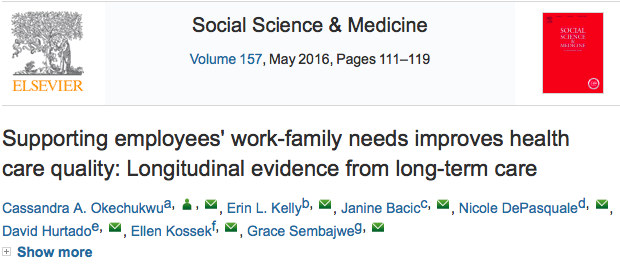Career
Working Conditions for Providers Affects Patient Health
New study: Flexible policies for workers result in better outcomes for patients.
Posted July 31, 2017
A recent study has found a link between the workplace policies affecting low-wage healthcare workers and the health of their patients. You read that right. The way that healthcare companies treat their employees doesn't just affect the well-being of the workers themselves, but the patients that they care for! I interviewed one of the authors of the study to learn more.
[You can listen to the full interview here, or just keep reading for a summary.]
The policies under scrutiny in this particular study are those to do with work-family balance and flexibility. Policies such as flex-time scheduling, allowing shift changes when an employee needs to care for a sick family member or attend appointments with them, and how emergencies are handled when an employee must leave a shift suddenly.

These type of policies directly impact the lives and well-being of the workers toiling under them, but they are tricky to solve because they also affect the employer and the work environment generally. It is not always efficient to allow flexible scheduling. It can be disruptive to others to swap shifts frequently or suddenly. There are costs associated when one employee must cover for another, especially if overtime comes into play. This is a thorny issue.
Policies on family-based demands have been studied extensively for so-called white collar workers, those in more managerial positions and earning higher salaries. But those employees have a stronger bargaining position, as evidenced by their higher salaries, and better benefits tend to go hand-in-hand with higher salaries. Those employees are in a less precarious position across the board.
In addition, studies on the effects of flexible work-family policies have consistently shown positive effects for employees, but mixed results for the employers, mostly due to the nature of the work itself. A lot of white-collar workers don't really have "shift work" in the sense that services don't suffer immediately if they suddenly need to take a break. But some jobs are more time- and shift-intensive and the business incurs costs when employees need flexibility.

This recent study is the first to look at low-wage, often called "blue collar" workers, in the healthcare setting. Blue collar healthcare workers in healthcare are the orderlies, nurse's aide, nursing assistants, and so on. A 2009 study revealed that almost half of people in those job titles in the United States live near or below the poverty line, so they are stressed in their home life to begin with. From the employer perspective, blue collar workers are also right on the front line of the business, directly providing services, interacting with patients and their families, and so on. It's tricky to accommodate flexible scheduling when disruptions can directly and immediately impact business operations.
In the healthcare setting, lower salary workers often provide the most frequent, routine, non-specialized care to patients, such as providing and servicing bedpans, changing linens, dispensing medication, changing dressings, mobilizing mostly sedentary patients, rotating immobilized patients, and so on.
A team of public health researchers from seven different institutions from Portland to Boston conducted a large study of 30 different long-term care facilities, interviewing over 150 managers and more than 1,200 blue collar healthcare workers. Through surveys and interviews, they analyzed the policies related to work-family flexibility and, even more importantly, how those policies were executed by managers and experienced by the workers. They then compared all of these results to measures of patient outcomes at the same 30 facilities.

The results were clear and dramatic. Facilities and managers that created a more flexible and manageable work environment for their workers exhibited better outcomes for the patients on a whole host of measures, including injuries, frequency of required mobilizations or rotating, healing times, and even cardiovascular measures. Residents at long-term care facilities whose employees had less flexibility experienced fewer linen changes, more falls, longer injury recovery times, more bedsores, and poorer overall health measures.
Several factors contribute to this reality. I recently sat down with Professor Grace Sembajwe of the CUNY School of Public Health, one of the authors of this study, to discuss the findings and their implications.

One major factor at play here is the health of the worker her or himself. As Dr. Sembajwe told me, "We know that the strain that comes with inflexibility at work can result in poorer cardiovascular health, disrupted sleep patterns, and so on. This means more missed days, more stressed, tired, and sick workers. They are not fully available to their patients when they are not well themselves."
Another factor is worker morale. Institutional psychologists have told us for years that workers who feel supported by their peers and managers are happier, healthier, and more committed to the work that they do. When an employee feels unappreciated or abused, their work suffers. When that work is providing healthcare to elderly or disabled patients, the "suffering" is literal.
It's important to remember that the managers, who are often registered nurses, are not usually choosing to be inflexible, but rather, as Dr. Sembajwe puts it, "they feel like they have an obligation to uphold the policies of the company." On the other hand, managers also have the power, if unofficially, to provide flexibility. "We have previously found that managers that were creative in their approach can find solutions that work for the employees. We observe better health measures in those employees," says Sembajwe. And the improved health likely extended to their patients, according to this new study.
What I like about this study is that it cuts through the political and "values" debates surrounding what kinds of accommodations employers should provide their workers. The needs of workers and the company's "bottom line" are not in tension. Rather, being flexible with the family demands of workers yields better outcomes for all involved, the worker her or himself and the patients. The facility can then assure their customers - the patients and their families — that they have put in place policies that science tells them is best for patients. It's a win all around.
When we consider what kind of care we want for our loved ones and ourselves, wouldn't we rather our providers be supported as they navigate their family and work demands? On thing I know is that if I ever find myself in a position of searching for a long-term care facility for a loved one, I will now have some questions about how they treat their workers.
To listen to the full interview on my podcast, click here.
References
Okechukwu, C. A., Kelly, E. L., Bacic, J., DePasquale, N., Hurtado, D., Kossek, E., & Sembajwe, G. (2016). Supporting employees' work-family needs improves health care quality: Longitudinal evidence from long-term care. Social Science & Medicine, 157, 111-119.




